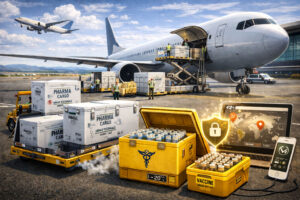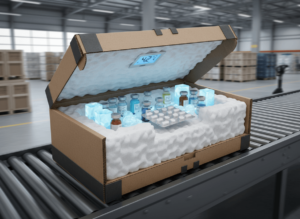Cold Chain Logistics for Biological Samples: Why It’s Critical?
When it comes to transporting biological samples—whether it’s blood, tissue, vaccines, or diagnostic specimens—temperature control is not just a technical requirement. It’s a lifeline. Behind every vial, there’s a patient waiting for answers, a diagnosis hanging in the balance, or a treatment that could save a life. That’s why refrigerated logistics for medical samples plays such a critical role in the world of healthcare, research, and life sciences.
The Fragile Nature of Biological Samples
Biological samples are highly sensitive to environmental changes, especially temperature fluctuations. A deviation of just a few degrees can compromise the viability or integrity of the sample, making it unusable for its intended purpose. This is especially true for:
- Blood and plasma samples used in diagnostics and research
- Tissue biopsies requiring preservation for pathology
- Vaccines and serums with strict storage and handling guidelines
- Genetic material like DNA, RNA, and stem cells
- COVID-19 swabs, reagents, and test kits
Each sample must be preserved at specific temperature ranges throughout the supply chain. Any break in that chain could render them useless, delay critical diagnoses, or compromise the accuracy of laboratory tests. In fields where time and precision are of the essence, these consequences can be devastating.
Cold Chain Isn’t Just Cold—It’s Controlled
There is a common misconception that cold chain logistics simply means keeping samples cold. In reality, it involves maintaining precise temperature ranges specific to the sensitivity of the sample:
- Frozen (-20°C or below): For long-term storage of vaccines, blood plasma, and reagents.
- Refrigerated (2–8°C): For most vaccines, insulin, and blood products.
- Controlled room temperature (15–25°C): For certain biological drugs and specimens.
Maintaining these temperatures requires a combination of validated packaging, temperature sensors, trained personnel, real-time monitoring, and fail-safe protocols. From pickup to delivery, the integrity of the sample must be preserved without compromise.
The High Stakes of Biological Transport
Consider a clinical trial site awaiting a set of temperature-sensitive samples flown in from another country. Or a regional hospital in need of a shipment of vaccines. If delays occur, or if the samples experience temperature excursions, the effects can be dire:
- Inaccurate lab results that lead to misdiagnosis or missed diagnoses
- Wasted time and resources on recollection and retesting
- Clinical trial disruptions with compromised data integrity
- Delay in patient care or treatment adjustments
- Complete loss of sensitive or irreplaceable samples
This is why strict compliance with regulations and industry best practices is essential. Global organizations such as the World Health Organization (WHO) and Good Distribution Practice (GDP) have established guidelines to ensure safe and effective transport of biological materials. Providers who fall short of these standards risk jeopardizing not just their shipments, but the health and safety of the patients and researchers depending on them.
Humanizing the Cold Chain
It’s easy to think of cold chain logistics in purely technical terms—refrigeration units, packaging specifications, thermal mapping, or lane validation. But behind every shipment is a story. A newborn awaiting a metabolic screening test. A cancer patient whose biopsy must be analyzed urgently. A scientist hoping to unlock a life-saving treatment.
These aren’t just packages. They are carriers of hope.
At TFI, we recognize the human element in every delivery. Every mile traveled, every degree maintained, and every second counted is a contribution to someone’s well-being. That’s why we go beyond logistics. We build solutions that understand the gravity of what’s inside each box.
What It Takes to Get It Right
Cold chain logistics for biological samples isn’t a one-size-fits-all approach. It requires a highly specialized and agile system that can adapt to the unique challenges of each shipment. Here are the essentials:
#1 Validated Packaging Solutions
Proper packaging ensures that temperature stability is maintained from origin to destination. This includes gel packs, phase change materials, dry ice, and vacuum-insulated panels. The packaging must be pre-tested under real-world conditions.
#2 Real-Time Temperature Monitoring
Sophisticated tracking tools offer continuous visibility into shipment conditions. If a deviation occurs, alerts are sent instantly to allow proactive intervention.
#3 Trained Personnel
Handling biological materials is not the same as general freight. It requires staff trained in handling UN3373 and UN2814 classified materials, proper labeling, documentation, and emergency procedures.
#4 Regulatory Compliance
Navigating international regulations is crucial. GDP compliance ensures that handling, storage, and transport meet international quality standards.
#5 Specialized Transportation
Vehicles with temperature-controlled compartments, airport-to-doorstep coordination, and contingency routes are essential to reducing risk.
#6 Speed and Reliability
In many cases, time is critical. Express shipping, priority customs clearance, and 24/7 support make the difference between success and failure.
Why the Right Partner Matters
Choosing a cold chain logistics provider isn’t just a matter of cost. It’s about reliability, consistency, and shared responsibility. You need a partner who understands that the cargo is not just time-sensitive—it’s life-sensitive.
Therefore, look for a provider with:
- Proven experience in biological sample logistics
- End-to-end cold storage logistics for clinical samples
- GDP and ISO certifications
- A network of global partners and last-mile capabilities
- Dedicated cold chain specialists who can troubleshoot in real time
A misstep in the logistics chain can be expensive. But more importantly, it can be irreversible.
Our Commitment at TFI
At TFI, we understand the magnitude of responsibility that comes with transporting biological samples. We know we’re not just moving a product—we’re protecting people’s health, supporting breakthrough research, and safeguarding critical medical processes.
Our cold chain logistics services are designed to deliver:
- GDP-compliant solutions that ensure quality and safety
- Validated packaging systems for every temperature range
- Real-time monitoring for complete transparency
- Expert handling by trained professionals
- Global reach with local precision
From refrigerated specimen shipping to clinical trial logistics and biopharmaceutical cold chain, we handle each shipment with care, speed, and integrity.
Our Case Study: Cold Chain for Biospecimens
TFI managed the urgent export of horse and camel blood samples from Abu Dhabi to Italy by ensuring regulatory compliance, using certified cold storage packaging, and coordinating temperature-controlled transport. Our in-house customs team and extensive global network enabled smooth clearance and on-time delivery while preserving the sample’s integrity.
Interested in learning more? Discover how we solved our client’s challenges by reading the full case study here, or you can also get in touch with our experts.




